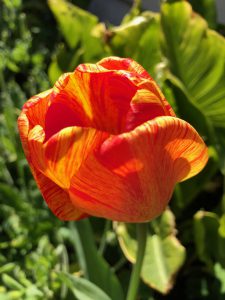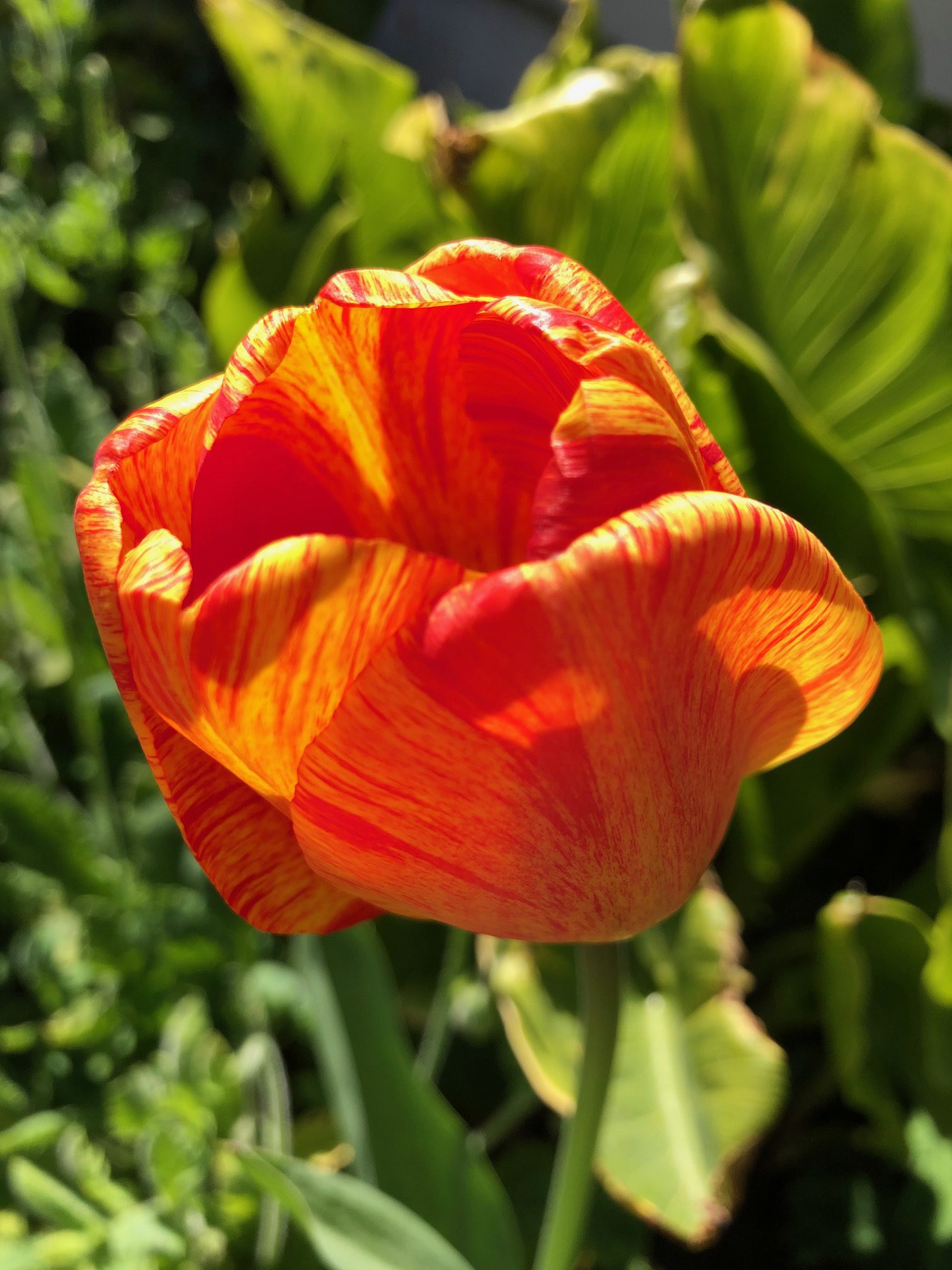Once, deep in an Alaskan winter in the abyss of a post-divorce-induced depression, I spent an entire Saturday sitting in the living room of my rented postwar cottage, rocking absentmindedly in a creaky chair, dog in my lap, staring through small frosted windowpanes at feathers of hoarfrost growing outward on tree branches, like polar bear fur. It wasn’t my intention to sit there all day, but I couldn’t stop–I watched the hoarfrost grow in shade, then recede in low midday sun, and I rejoiced when it began to form again toward evening. A slow, crystalline world at twenty below, accompanied by the silence of an old house, a small dog, and an awe-struck middle-aged woman. I sat there long enough for the sun to track across the sky, to watch where it backlit new pattern-frosted branches in the progression of its arc. From dawn to dark I watched how the light changed, how the frost danced; it was a meditative fugue state, a transformation, a glimpse into what author Robert MacFarlane calls deep time, and an inkling of how the scale of time marked by non-humans and seemingly inanimate things is hard to imagine, despite our big brains.
Covid-19 is altering everything. In paradigm-shifting events like this, we mark our lifetimes by the before and after of it. What seemed far-fetched in early March is normal in April; deserted streets, closed shops, images of overrun hospitals as combat zones, suggest a dystopian future. What seemed so surefooted (the economy, the federal stockpile, the ability of our government to act as one body in a crisis) has stumbled. We don’t even know how long this will last, so how are we supposed to cope?
Some people see a chance for a broad reset when it’s finally over, on everything from fossil fuels and climate change, to how war is waged, to prioritizing public health and environmental policy and addressing cultural and racial inequalities. I love that altruistic optimism, and hope those things will happen. Others predict autocrats will seize more power, that there will come a massive corporate-political gaslighting campaign that will try to convince us the pandemic wasn’t so bad, saying consumers should all go back to exactly the way things were. Nobody knows what the full scope of this catastrophe will be, or what might be brought forward from it to remedy problems and improve lives, or further devastate them. This loss of once-basic certainties is fearful. But the rise of once-insurmountable possibilities is heartening.
What we do know after lifetimes of being reminded by nine-to-five jobs bookended by weekends and highly measured holidays, is that our time has never really felt like it was our own. Yet now, with too much time on our hands, it can feel disorienting. Civilized time has always felt bottled, and now it’s not. So what can you do with time? You can keep it, kill it, free it, make it, spend it, do it, span it, and try to stop it. Or you can expand it, and remember it.
I’d never before tried sitting in one place for a whole day, listening to the stillness that included my own body and mind, while watching the ways a low winter sun could work its magic with ice. Our culture’s difficulty with spending time alone with ourselves is not new. The seventeenth-century French mathematician Blaise Pascal said, “All of humanity’s problems stem from man’s inability to sit quietly in a room alone.” That subzero, hoarfrosted glimpse of a deeper way to spend time remains vivid. By evening, my depression had lifted; how could it not? I saw things I had never taken the time to see, and the memory of that day still brings me to a place of quiet peace. What about you? Can you find the unnoticed new in the everyday ordinary? Do you have a hoarfrost memory? Now is the time to summon it, or, perhaps, to make a new one.

I think I’ll go watch this backyard tulip open.

Karen, I love this piece. Especially the last line. I learned to appreciate being able to sit and have the time to notice what was around me when I was on watch in Terrwyn’s cockpit. It took me a long time to not need a book or music to distract me but I finally learned how to just be, for hours and not only enjoy it but craved it. I am now back on watch.
Thank you for you beautiful writing.
Much love
Cath
Thank you, Cathy. Yes, good metaphor, we are all on watch in what feels like an endless voyage. I have been thinking of you lately and hoping all is well with you. It’s great to see how Bill is nearing New Zealand. I hope that later this year we can take you out aboard Raven again, to meet him when he sails back to Victoria.
The images you create with your writing are beautiful! I keep my mornings busy with household doings and fitness. Then the afternoon sunshine slows me down and makes me happy to be still. Highlights are marked by catching a neighbor outdoors and having a chat … at the proper distance, of course but it’s still nice.
Thank you, Laurie. Slowing down is when you notice things, and not just externally. Have you ever been out walking, and you have a thought about something you never realized before, and your pace slows down? I’m glad you practice the art of slowing down.
Hi Sullivan!
Your words are stimulating and make all of my positive images dance as if we were carefree, young kids again! The worry gone as the music of your words penetrate my being! You are a gift like no other.❤️
Oh Fusco, that brought tears to my eyes. Thank you, and hang in there, dear friend of my childhood.
Thank you for absolutely capturing what has been floating around in my brain for some time now. I can’t seem to distill the thoughts into a cogent description… nope, it’s like herding cats. And yet, I’m comfortable with this vagueness. Of course I’m concerned, and curious about how this will turn out. But I’m not fretting. In fact, I’m pretty sure that both of the scenarios you described will occur and the struggle between people with differing visions will continue. Change is mostly uncomfortable and getting everyone on the same page is like … wait for it… herding cats!
Helmeyer! You write so well! It’s a slippery concept, though, isn’t it. There’s so much more floating around in the ether just out of conscious reach. That’s the hard part, the vagueness. This plague (and did you notice plague rhymes with vague?) has insinuated its way into everything, including our emotional capacities. It’s almost like we’re all fish trying to figure out, what is water?
Beautiful thoughts and descriptions, Karen. I love McFarlane (especially Wild Places) and read his work often. Here’s to all the the essential workers, stressed parents, the millions of unemployed having a day (or a moment) of this kind of peace very soon.
Yes, Anna, thank you. Here’s to everyone who’s essential to this world. I cannot think of a single person who’s not. ❤️
Beautifully written Karen. Lots to contemplate. Your writing reminds me that this situation we find ourselves in has hidden gifts, Time being the biggest and rarest of those gifts for me. I know others are not as fortunate. I think I’ll read it again and again. Thank you.
Time can be a conundrum of a gift, the most hidden one being that people are no longer focused exclusively forward, they are looking all around, and seeing each other. I love that.
This reminds me of when my husband and I went to Crater Lake. A friend of ours warned me, “it’s just a giant hole filled with water. After looking at it for five minutes, theres nothing left to do.”
But my experience was like your hoarfrost experience. I could’ve sat staring at that magnificent lake the entire day. The only reason I didn’t was because it was opening day, and crammed with tourists.
Yes, this isolated time is like that day. I notice the colors in my yard more, and the subtle changes in my pets’ behavior when they want something. Today my dog let me know, without words, she wanted a drink of water.
Yet the more time I spend slowed down, the guiltier I feel. Wonder what that says about our modern culture…
It says a lot, Mashaw. That we still feel guilty for sensing our aliveness in those slow moments will, I hope, subside in the coming months. Who was it, Mary Oliver? who said, “What will you do with your one wild and precious life?” Wouldn’t it be great if the way of seeing like you did at Crater Lake became the default, and the rushing around was the error? Each morning around 6:30 I go for a walk through the neighborhood–people are just waking, having coffee, starting another quiet day. The streets are deserted and the silence is so profound that the birds appear to be shouting. I noticed that the robins have claimed one part of the street, the wrens have another, and the crows still another. Bird neighborhoods, who knew? My goal is to notice one new thing each day, even if it’s the same streets I walked yesterday. So far it’s working, and it feels good to be so present in the moment. That and friendships maintained are what help keep me going.